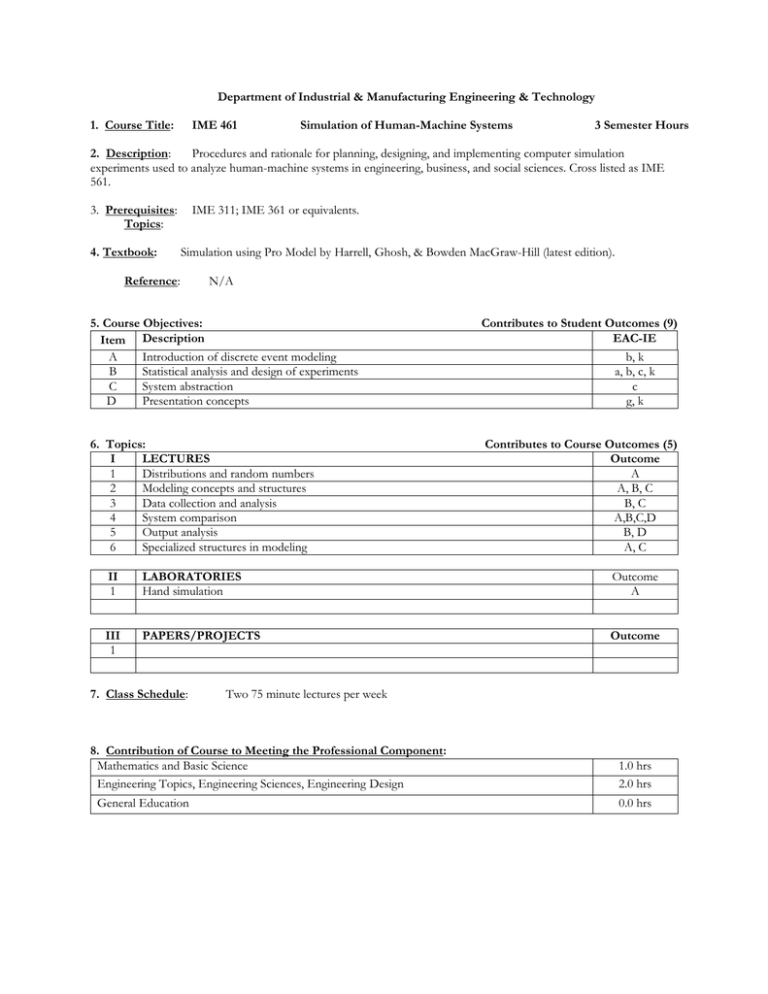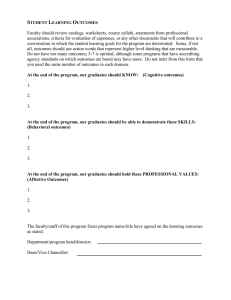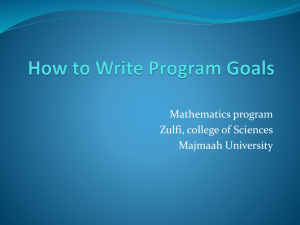Department of Industrial & Manufacturing Engineering & Technology IME 461
advertisement

Department of Industrial & Manufacturing Engineering & Technology 1. Course Title: IME 461 Simulation of Human-Machine Systems 3 Semester Hours 2. Description: Procedures and rationale for planning, designing, and implementing computer simulation experiments used to analyze human-machine systems in engineering, business, and social sciences. Cross listed as IME 561. 3. Prerequisites: Topics: 4. Textbook: IME 311; IME 361 or equivalents. Simulation using Pro Model by Harrell, Ghosh, & Bowden MacGraw-Hill (latest edition). Reference: N/A 5. Course Objectives: Item Description A Introduction of discrete event modeling B Statistical analysis and design of experiments C System abstraction D Presentation concepts Contributes to Student Outcomes (9) EAC-IE b, k a, b, c, k c g, k 6. Topics: I LECTURES 1 Distributions and random numbers 2 Modeling concepts and structures 3 Data collection and analysis 4 System comparison 5 Output analysis 6 Specialized structures in modeling Contributes to Course Outcomes (5) Outcome A A, B, C B, C A,B,C,D B, D A, C II 1 LABORATORIES Hand simulation Outcome A III 1 PAPERS/PROJECTS Outcome 7. Class Schedule: Two 75 minute lectures per week 8. Contribution of Course to Meeting the Professional Component: Mathematics and Basic Science Engineering Topics, Engineering Sciences, Engineering Design General Education 1.0 hrs 2.0 hrs 0.0 hrs 9. Relationship of Course to IE Student Outcomes: Code Student Outcomes, A Graduate from the Program Will Have: Industrial Engineering graduates will have an ability to apply knowledge of mathematics a and science to system modeling and to problems related to production processes or services. Industrial Engineering graduates will have an ability to design and conduct experiments, b and to analyze and interpret data. Industrial Engineering graduates will have an ability to design, select, implement, and control a manufacturing or service system and its components or processes to meet desired c needs. Industrial Engineering graduates will have an ability to function on multi-disciplinary teams d and the ability to apply a concurrent approach and project management to process and product development. Industrial Engineering graduates will have an ability to identify, formulate, and determine e optimal solutions to system problems, while considering physical and economic constraints as well as safety and ergonomic issues. f Industrial Engineering graduates will have an understanding of the professional and ethical responsibilities of an industrial engineer. Industrial Engineering graduates will have an ability to effectively communicate technical g and social concepts through appropriate methods. Industrial Engineering graduates will have an understanding of the impact of industrial h engineering solutions in a global, economic, environmental, and societal context. Industrial Engineering graduates will have the recognition of the need for, and an ability to i engage in lifelong learning. j Industrial Engineering graduates will have knowledge of contemporary issues facing engineers. Industrial Engineering graduates will have an ability to use the proper techniques, skills, k and modern engineering tools necessary for industrial engineering practice utilizing supporting technologies. 10. Prepared by: Dennis E. Kroll New student outcomes updated on 12-28-2012 Contribution 3.00 1.83 2.25 1.86 1.25 1.50 1.50 3.00 Reviewed by: Curriculum Committee



